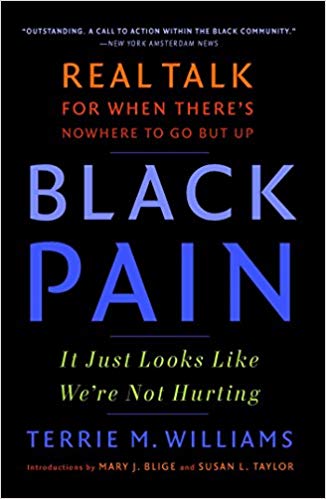12 Books on Behavioral Health Written By Black People
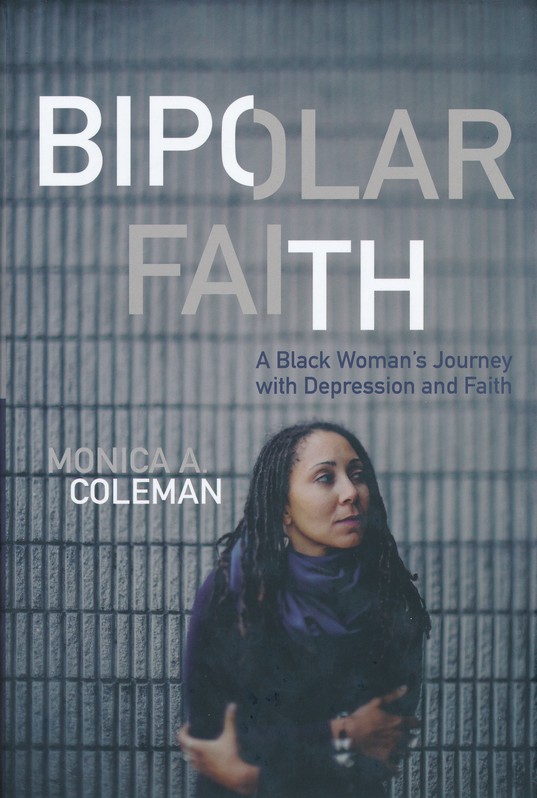
Bipolar Faith: A Black Woman’s Journey with Depression and Faith by Monica A. Coleman
Monica A. Coleman’s great-grandfather asked his two young sons to lift him up and pull out the chair when he hanged himself, and that noose stayed in the family shed for years. The rope was the violent instrument, but it was mental anguish that killed him. Now, in gripping fashion, Coleman examines the ways that the legacies of slavery, war, sharecropping, poverty, and alcoholism mask a family history of mental illness. Those same forces accompanied her into the black religious traditions and Christian ministry. All the while, she wrestled with her own bipolar disorder.
Bipolar Faith is both a spiritual autobiography and a memoir of mental illness. In this powerful book, Monica Coleman shares her life-long dance with trauma, depression, and the threat of death. Citing serendipitous encounters with black intellectuals like Henry Louis Gates, Jr., Angela Davis, and Renita Weems, Coleman offers a rare account of how the modulated highs of bipolar II can lead to professional success, while hiding a depression that even her doctors rarely believed. Only as she was able to face her illness was she able to live faithfully with bipolar. And in the process, she discovered a new and liberating vision of God.
Willow Weep for Me: A Black Woman’s Journey Through Depression by Meri Nana-Ama Danquah
This moving memoir of an African-American woman’s lifelong fight to identify and overcome depression offers an inspirational story of healing and emergence. Wrapped within Danquah’s engaging account of this universal affliction is rare and insightful testimony about what it means to be black, female, and battling depression in a society that often idealizes black women as strong, nurturing caregivers. A startlingly honest, elegantly rendered depiction of depression, Willow Weep for Me calls out to all women who suffer in silence with a life-affirming message of recovery. Meri Danquah rises from the pages, a true survivor, departing a world of darkness and reclaiming her life.
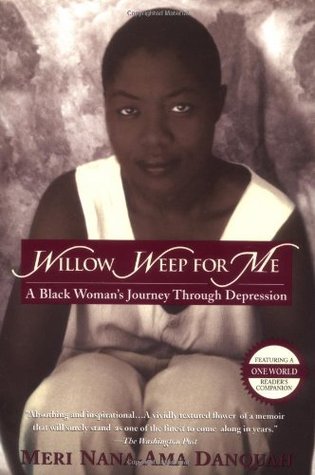

I’m Telling The Truth, but I’m Lying: Essays by Bassey Ikpi
From her early childhood in Nigeria through her adolescence in Oklahoma, Bassey Ikpi lived with a tumult of emotions, cycling between extreme euphoria and deep depression—sometimes within the course of a single day. By the time she was in her early twenties, Bassey was a spoken word artist and traveling with HBO’s Def Poetry Jam, channeling her life into art. But beneath the façade of the confident performer, Bassey’s mental health was in a precipitous decline, culminating in a breakdown that resulted in hospitalization and a diagnosis of Bipolar II.
In I’m Telling the Truth, But I’m Lying, Bassey Ikpi breaks open our understanding of mental health by giving us intimate access to her own. Exploring shame, confusion, medication, and family in the process, Bassey looks at how mental health impacts every aspect of our lives—how we appear to others, and more importantly to ourselves—and challenges our preconception about what it means to be “normal.” Viscerally raw and honest, the result is an exploration of the stories we tell ourselves to make sense of who we are—and the ways, as honest as we try to be, each of these stories can also be a lie.
Heavy by Kiese Laymon
In Heavy, Laymon writes eloquently and honestly about growing up a hard-headed black son to a complicated and brilliant black mother in Jackson, Mississippi. From his early experiences of sexual violence, to his suspension from college, to time in New York as a college professor, Laymon charts his complex relationship with his mother, grandmother, anorexia, obesity, sex, writing, and ultimately gambling. Heavy is a “gorgeous, gutting…generous” (The New York Times) memoir that combines personal stories with piercing intellect to reflect both on the strife of American society and on Laymon’s experiences with abuse. By attempting to name secrets and lies he and his mother spent a lifetime avoiding, he asks us to confront the terrifying possibility that few in this nation actually know how to responsibly love, and even fewer want to live under the weight of actually becoming free.
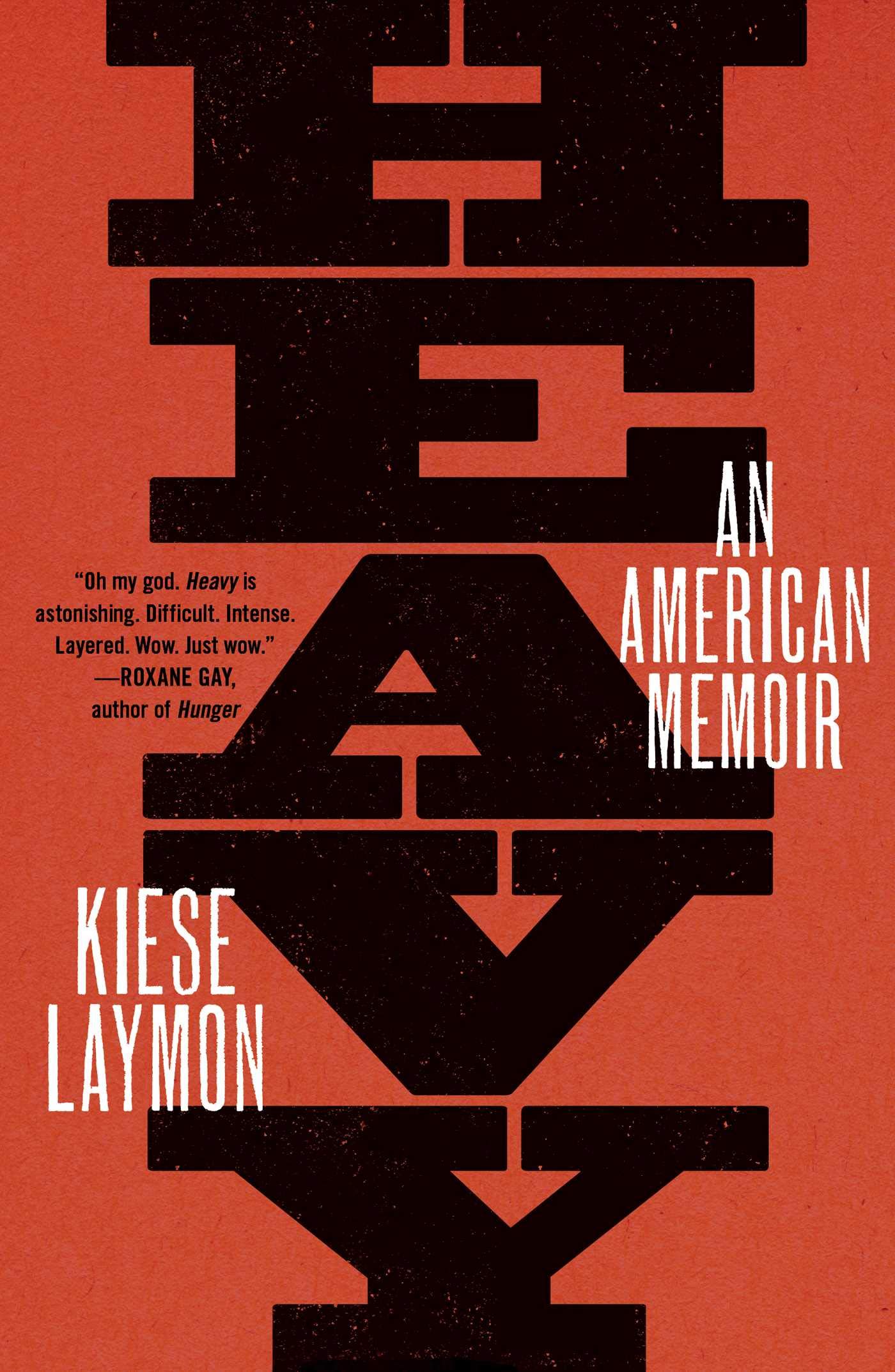
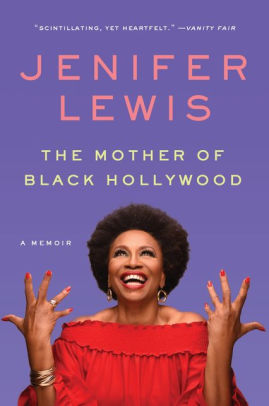
The Mother of Black Hollywood by Jenifer Lewis
From her more than three hundred appearances for film and television, stage and cabaret, performing comedy or drama, as an unforgettable lead or a scene stealing supporting character, Jenifer Lewis has established herself as one of the most respected, admired, talented, and versatile entertainers working today.
This “Mega Diva” and costar of the hit sitcom black-ish bares her soul in this touching and poignant—and at times side-splittingly hilarious—memoir of a Midwestern girl with a dream, whose journey took her from poverty to the big screen, and along the way earned her many accolades.
With candor and warmth, Jenifer Lewis reveals the heart of a woman who lives life to the fullest. This multitalented “force of nature” landed her first Broadway role within eleven days of her graduation from college and later earned the title “Reigning Queen of High-Camp Cabaret.”
In the audaciously honest voice that her fans adore, Jenifer describes her transition to Hollywood, with guest roles on hits like The Fresh Prince of Bel-Air and Friends. Her movie Jackie’s Back! became a cult favorite, and as the “Mama” to characters portrayed by Whitney Houston, Tupac Shakur, Taraji P. Henson, and many more, Jenifer cemented her status as the “Mother of Black Hollywood.”
When an undiagnosed menatl illness stymies Jenifer’s career, culminating in a breakdown while filming The Temptations, her quest for wholeness becomes a harrowing and inspiring tale, including revelations of bipolar disorder and sex addiction.
Written with no-holds-barred honesty and illustrated with more than forty color photographs, this gripping memoir is filled with insights gained through a unique life that offers a universal message: “Love yourself so that love will not be a stranger when it comes.”
My Grandmother’s Hands: Racialized Trauma and the Pathway to Mending Our Hearts and Bodies by Resmaa Menakem MSW, LICSW, SEP
The body is where our instincts reside and where we fight, flee, or freeze, and it endures the trauma inflicted by the ills that plague society. In this groundbreaking work, therapist Resmaa Menakem examines the damage caused by racism in America from the perspective of body-centered psychology. He argues this destruction will continue until Americans learn to heal the generational anguish of white supremacy, which is deeply embedded in all our bodies. Our collective agony doesn’t just affect African Americans. White Americans suffer their own secondary trauma as well. So do blue Americans–our police.
My Grandmother’s Hands is a call to action for all of us to recognize that racism is not about the head, but about the body, and introduces an alternative view of what we can do to grow beyond our entrenched racialized divide.
- Paves the way for a new, body-centered understanding of white supremacy–how it is literally in our blood and our nervous system.
- Offers a step-by-step solution–a healing process–in addition to incisive social commentary.
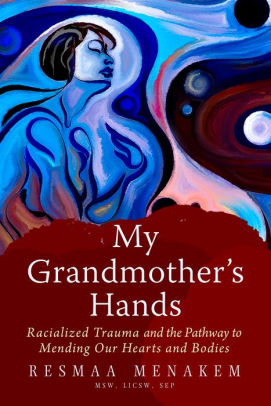
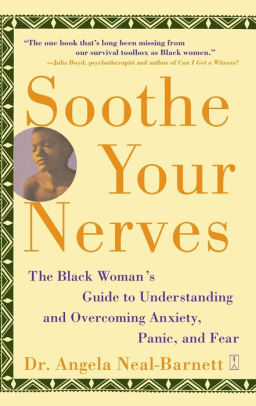
Soothe Your Nerves: The Black Woman’s Guide to Understanding and Overcoming Anxiety, Panic, and Fear by Dr. Angela Neal-Barnett
Do you or someone you love suffer from “bad nerves”?
- Denise is constantly on edge. She’s convinced something bad is going to happen.
- Ruth will drive an hour out of her way to avoid driving over a bridge. When she has to do it, her chest thumps, her heart starts racing, and she breaks out in a sweat. She’s beginning to think she shouldn’t leave her house.
- Bernice hasn’t slept in two months for fear that the witch is going to ride her again.
What do these women have in common? They are struggling with crippling anxiety disorders.
Thousands of Black women suffer from anxiety. What’s worse is that many of us have been raised to believe we are Strong Black Women and that seeking help shows weakness. So we often turn to dangerous quick fixes that only exacerbate the problem — like overeating and drug and alcohol abuse — or we deny that we have problems at all.
In Soothe Your Nerves, Dr. Angela Neal-Barnett explains which factors can contribute to anxiety, panic, and fear in Black women and offers a range of healing methods that will help you or a loved one reclaim your life.
Here finally is a blueprint for understanding and overcoming anxiety from a psychological, spiritual, and Black perspective.
The Color of Hope: People of Color Mental Health Narratives by Iresha Picot
The Color of Hope: People of Color Mental Health Narratives is a project that sheds light on mental health in communities of color by sharing stories by those affected by mental illness. By sharing our stories, we open up discussion around the topic and break through stigma and shame.
The contributors represent those living with or affected by loved ones with depression, bipolar disorder, borderline personality disorder, post-traumatic stress disorder, schizophrenia, and other conditions.
They are men and women, children and adults, political prisoners, college students, politicians, musicians, business people, artists, fathers, mothers, daughters…all of African, Latino, and Asian descent. Their narratives add to the tapestry of the human experience and without them, our history is incomplete.
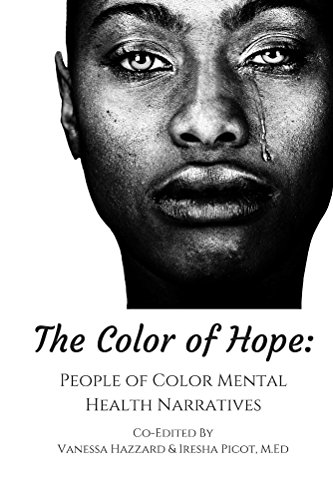
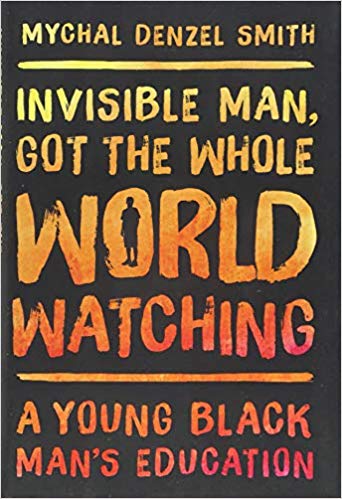
Invisible Man, Got the Whole World Watching: A Young Black Man’s Education by Mychal Denzel Smith
How do you learn to be a black man in America? For young black men today, it means coming of age during the presidency of Barack Obama. It means witnessing the deaths of Oscar Grant, Trayvon Martin, Michael Brown, Akai Gurley, and too many more. It means celebrating powerful moments of black self-determination for LeBron James, Dave Chappelle, and Frank Ocean.
In Invisible Man, Got the Whole World Watching, Mychal Denzel Smith chronicles his own personal and political education during these tumultuous years, describing his efforts to come into his own in a world that denied his humanity. Smith unapologetically upends reigning assumptions about black masculinity, rewriting the script for black manhood so that depression and anxiety aren’t considered taboo, and feminism and LGBTQ rights become part of the fight. The questions Smith asks in this book are urgent–for him, for the martyrs and the tokens, and for the Trayvons that could have been and are still waiting.
Preventing Bipolar Relapse: A Lifestyle Program to Help You Maintain a Balanced Mood and Live Well by Ruth C. White PhD, MPH, MSW
If you buy just one book on bipolar disorder, let this be it.
There’s an old saying: “Prevention is better than cure.” If you have bipolar disorder, this is especially true. For you, it’s incredibly important to read the warning signs of a possible episode. For instance, you may find you are not sleeping as well as usual, or you might be sleeping too much. You may stop doing things that you normally enjoy, or you may start acting out your impulses in ways that alienate those around you or get you into trouble.
While the path to wellness for those with bipolar may involve psychiatric visits and medication adjustments, preventing manic and depressive episodes is the true key to staying healthy and happy. So how do you do it? And most importantly, how can you keep yourself motivated?
In this powerful, breakthrough book, bipolar expert Ruth C. White shares her own personal approach to relapse prevention using the innovative program SNAP (Sleep, Nutrition, Activity, and People). White also offers practical tips and tracking tools you can use anytime, anywhere. By making necessary lifestyle adjustments, you can maintain balanced moods, recognize the warning signs of an oncoming episode, and make the necessary changes to reduce or prevent it.
This is the first and only book on bipolar disorder that focuses exclusively on prevention. To help you stay well, White includes links to helpful online tracking tools so that you can manage your symptoms, anytime, anywhere. If you are ready to stop living in fear of your next episode, this life-changing book can help you take charge of your diagnosis—and your life.
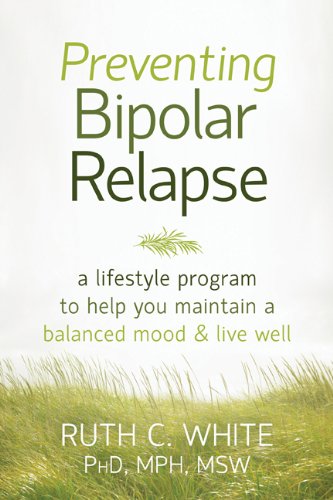
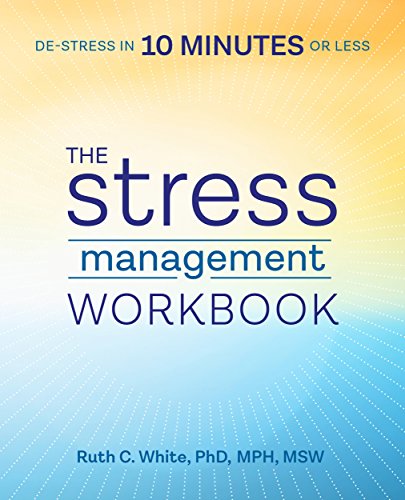
The Stress Management Workbook: De-Stress in 10 Minutes or Less by Dr. Ruth C. White PhD, MPH, MSW
Reduce your stress in 10 minutes or less with the practical exercises and quick strategies in The Stress Management Workbook.
Learning how to manage your stress shouldn’t be stressful. With The Stress Management Workbook you’ll get the relief you need in a time frame that works for you. With concrete exercises that require no more than 10 minutes each, The Stress Management Workbook will help you build sustainable stress management skills for significantly reducing stress–now and for the future.
In The Stress Management Workbook, leading stress management and mental wellness expert Dr. Ruth White teaches you how to keep your brain sharp, improve your mind’s response to stress, and develop strategies for minimizing stress. This fresh set of stress management skills will empower you to perform better at work, increase your energy, foster better relationships, and be healthier in both mind and body.
Effective and easy-to-follow, The Stress Management Workbook will teach you to:
- Identify sources of stress through checklists, quizzes, and other informative activities
- Set personal stress management goals that will prepare you for the work you’re about to do
- Learn to handle stress in the moment with interactive exercises that require no more than one, five, or ten minutes
- Build long-term strategies that support your personal goals and foster positive lifestyle changes for a more fulfilling life
A happier, stress-free life is within reach. Learn how to change the way you respond to stress in your daily life with the practical guidance in The Stress Management
Black Pain: It Just Looks Like We’re Not Hurting by Terrie Williams
Terrie Williams knows that Black people are hurting. She knows because she’s one of them.
Terrie had made it: she had launched her own public relations company with such clients as Eddie Murphy and Johnnie Cochran. Yet she was in constant pain, waking up in terror, overeating in search of relief. For thirty years she kept on her game face of success, exhausting herself daily to satisfy her clients’ needs while neglecting her own.
Terrie finally collapsed, staying in bed for days. She had no clue what was wrong or if there was a way out. She had hit rock bottom and she needed and got help.
She learned her problem had a name — depression — and that many suffered from it, limping through their days, hiding their hurt. As she healed, her mission became clear: break the silence of this crippling taboo and help those who suffer.
Black Pain identifies emotional pain — which uniquely and profoundly affects the Black experience — as the root of lashing out through desperate acts of crime, violence, drug and alcohol abuse, eating disorders, workaholism, and addiction to shopping, gambling, and sex. Few realize these destructive acts are symptoms of our inner sorrow.
Black people are dying. Everywhere we turn, in the faces we see and the headlines we read, we feel in our gut that something is wrong, but we don’t know what it is. It’s time to recognize it and work through our trauma.
In Black Pain, Terrie has inspired the famous and the ordinary to speak out and mental health professionals to offer solutions. The book is a mirror turned on you. Do you see yourself and your loved ones here? Do the descriptions of how the pain looks, feels, and sounds seem far too familiar? Now you can do something about it.
Stop suffering. The help the community needs is here: a clear explanation of our troubles and a guide to finding relief through faith, therapy, diet, and exercise, as well as through building a supportive network (and eliminating toxic people).
Black Pain encourages us to face the truth about the issue that plunges our spirits into darkness, so that we can step into the healing light.
You are not on the ledge alone.
